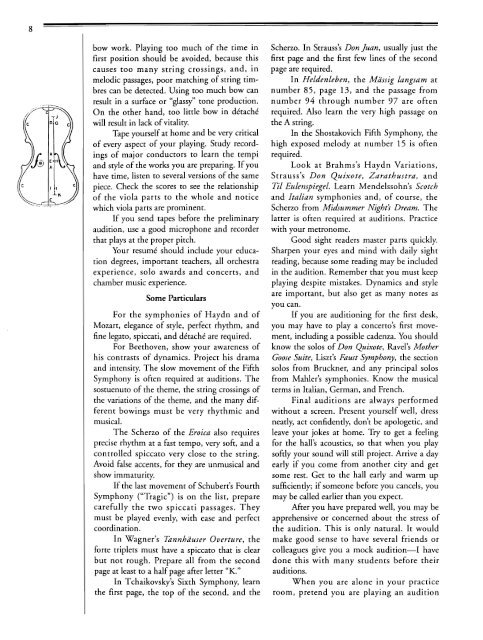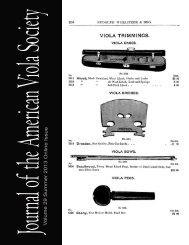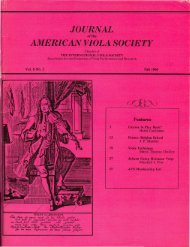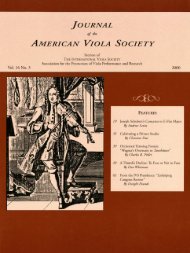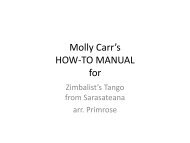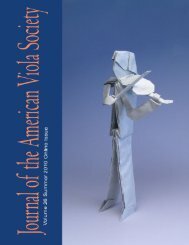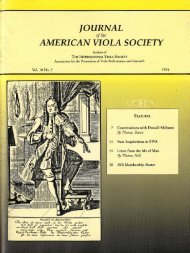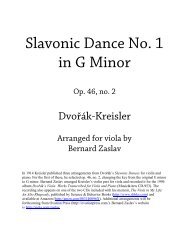Journal of the American Viola Society Volume 10 No. 2, 1994
Journal of the American Viola Society Volume 10 No. 2, 1994
Journal of the American Viola Society Volume 10 No. 2, 1994
Create successful ePaper yourself
Turn your PDF publications into a flip-book with our unique Google optimized e-Paper software.
8<br />
bow work. Playing too much <strong>of</strong> <strong>the</strong> time in<br />
first position should be avoided, because this<br />
causes too many string crossings, and, in<br />
melodic passages, poor matching <strong>of</strong> string timbres<br />
can be detected. Using too much bow can<br />
result in a surface or "glassy" tone production.<br />
On <strong>the</strong> o<strong>the</strong>r hand, too little bow in de tache<br />
will result in lack <strong>of</strong>vitality.<br />
Tape yourself at home and be very critical<br />
<strong>of</strong> every aspect <strong>of</strong> your playing. Study recordings<br />
<strong>of</strong> major conductors to learn <strong>the</strong> tempi<br />
and style <strong>of</strong> <strong>the</strong> works you are preparing. Ifyou<br />
have time, listen to several versions <strong>of</strong> <strong>the</strong> same<br />
piece. Check <strong>the</strong> scores to see <strong>the</strong> relationship<br />
<strong>of</strong> <strong>the</strong> viola parts to <strong>the</strong> whole and notice<br />
which viola parts are prominent.<br />
If you send tapes before <strong>the</strong> preliminary<br />
audition, use a good microphone and recorder<br />
that plays at <strong>the</strong> proper pitch.<br />
Your resume should include your education<br />
degrees, important teachers, all orchestra<br />
experience, solo awards and concerts, and<br />
chamber music experience.<br />
Some Particulars<br />
For <strong>the</strong> symphonies <strong>of</strong> Haydn and <strong>of</strong><br />
Mozart, elegance <strong>of</strong> style, perfect rhythm, and<br />
fine legato, spiccati, and detache are required.<br />
For Beethoven, show your awareness <strong>of</strong><br />
his contrasts <strong>of</strong> dynamics. Project his drama<br />
and intensity. The slow movement <strong>of</strong> <strong>the</strong> Fifth<br />
Symphony is <strong>of</strong>ten required at auditions. The<br />
sostuenuto <strong>of</strong> <strong>the</strong> <strong>the</strong>me, <strong>the</strong> string crossings <strong>of</strong><br />
<strong>the</strong> variations <strong>of</strong> <strong>the</strong> <strong>the</strong>me, and <strong>the</strong> many different<br />
bowings must be very rhythmic and<br />
musical.<br />
The Scherzo <strong>of</strong> <strong>the</strong> Eroica also requires<br />
precise rhythm at a fast tempo, very s<strong>of</strong>t, and a<br />
controlled spiccato very close to <strong>the</strong> string.<br />
Avoid false accents, for <strong>the</strong>y are unmusical and<br />
show immaturity.<br />
If <strong>the</strong> last movement <strong>of</strong> Schubert's Fourth<br />
Symphony ("Tragic") is on <strong>the</strong> list, prepare<br />
carefully <strong>the</strong> two spiccati passages. They<br />
must be played evenly, with ease and perfect<br />
coordination.<br />
In Wagner's Tannhauser Overture, <strong>the</strong><br />
forte triplets must have a spiccato that is clear<br />
but not rough. Prepare all from <strong>the</strong> second<br />
page at least to a half page after letter "K."<br />
In T chaikovsky's Sixth Symphony, learn<br />
<strong>the</strong> first page, <strong>the</strong> top <strong>of</strong> <strong>the</strong> second, and <strong>the</strong><br />
Scherzo. In Strauss's Don juan, usually just <strong>the</strong><br />
first page and <strong>the</strong> first few lines <strong>of</strong> <strong>the</strong> second<br />
page are required.<br />
In HeIden leben , <strong>the</strong> Massig langsam at<br />
number 85, page 13, and <strong>the</strong> passage from<br />
number 94 through number 97 are <strong>of</strong>ten<br />
required. Also learn <strong>the</strong> very high passage on<br />
<strong>the</strong> A string.<br />
In <strong>the</strong> Shostakovich Fifth Symphony, <strong>the</strong><br />
high exposed melody at number 15 is <strong>of</strong>ten<br />
required.<br />
Look at Brahms's Haydn Variations,<br />
Strauss's Don Quixote, Zarathustra, and<br />
Til Eulenspiegel. Learn Mendelssohn's Scotch<br />
and Italian symphonies and, <strong>of</strong> course, <strong>the</strong><br />
Scherzo from Midsummer Night's Dream. The<br />
latter is <strong>of</strong>ten required at auditions. Practice<br />
with your metronome.<br />
Good sight readers master parts quickly.<br />
Sharpen your eyes and mind with daily sight<br />
reading, because some reading may be included<br />
in <strong>the</strong> audition. Remember that you must keep<br />
playing despite mistakes. Dynamics and style<br />
are important, but also get as many notes as<br />
you can.<br />
If you are auditioning for <strong>the</strong> first desk,<br />
you may have to playa concerto's first movement,<br />
including a possible cadenza. You should<br />
know <strong>the</strong> solos <strong>of</strong> Don Quixote, Ravel's Mo<strong>the</strong>r<br />
Goose Suite, Liszt's Faust Symphony, <strong>the</strong> section<br />
solos from Bruckner, and any principal solos<br />
from Mahler's symphonies. Know <strong>the</strong> musical<br />
terms in Italian, German, and French.<br />
Final auditions are always performed<br />
without a screen. Present yourself well, dress<br />
neatly, act confidently, don't be apologetic, and<br />
leave your jokes at home. Try to get a feeling<br />
for <strong>the</strong> hall's acoustics, so that when you play<br />
s<strong>of</strong>tly your sound will still project. Arrive a day<br />
early if you come from ano<strong>the</strong>r city and get<br />
some rest. Get to <strong>the</strong> hall early and warm up<br />
sufficiently; if someone before you cancels, you<br />
may be called earlier than you expect.<br />
After you have prepared well, you may be<br />
apprehensive or concerned about <strong>the</strong> stress <strong>of</strong><br />
<strong>the</strong> audition. This is only natural. It would<br />
make good sense to have several friends or<br />
colleagues give you a mock audition-I have<br />
done this with many students before <strong>the</strong>ir<br />
auditions.<br />
When you are alone in your practice<br />
room, pretend you are playing an audition


